Toxic herbal medicine traced to mainland
Updated: 2010-05-12 07:37
By Timothy Chui(HK Edition)
|
|||||||||

The source of a contaminated batch of Chinese medicinal herbs which left a 36-year-old woman hospitalized has been traced to the mainland.
A spokesman for the Government Laboratory said tests showed the neurotoxin aconitine was present in samples of Ligusticum root. The samples were taken from Yan Chai Hopital's Chinese Medicine Clinic dispensary, the place where the woman who fell ill had filled her prescription last week.
Two hours after she ingested the herb, Friday, and before she lost consciousness, the woman's mouth and limbs became numb .
She was admitted to Yan Chai Hospital, where she has been reported to be in stable condition.
The clinic purchased the batch of Ligusticum root, or Gao Ben, from a new wholesaler, Zhixin Group Limited, last month.
A Centre for Health Protection (CHP) spokesman said the chances of cross-contamination at the clinic were slim since the batch was supplied prepacked before it was emptied into containers in the dispensary.
Chasing the shipment up the supply chain, the CHP found the wholesaler had sourced the herbs from the mainland.
The wholesaler has been instructed to warn its customers while mainland authorities are following up the investigation.
The Department of Health (DH) has taken samples from 13 other Hospital Authority Chinese medicine clinics to determine how much of and how far the contaminated herbs have been distributed.
The DH has also alerted Accident and Emergency departments to the toxin's symptoms although there is no antidote.
The poisoning has prompted the head of the Hong Kong Medical Association, Tse Hung-hing, to call for more oversight of Chinese medicines.
"The Department of Health should see that these medicines are better regulated and manufactured under stringent supervision," he said, adding the neurotoxin aconitine can interrupt neural transmission, paralyzing muscles, disrupting respiration and even causing cardiac arrest.
Aconitine has been found in several herbs in Chinese medicine which are prescribed to treat pain and rheumatism.
According to a study conducted by the Chinese University of Hong Kong Department of Medicine and Therapeutics, toxicologist Thomas Chan, the toxin is used to treat pain and fever, but assigning proper dosages can be problematic.
Hong Kong Chinese Herbalist Association president Kwan Chi-yee said people should not buy random herbs, especially when on the mainland and without advice from certified Chinese medical practitioners.
He said it was rare for people to suffer from aconitine poisoning, adding the chances of poisoning were zero if Chinese medicine doctors prescribed the proper amount and if patients followed instructions.
Nearly 300 of the 4,342 cases handled by the Hospital Authority's Poison Information Centre last year involved Chinese medicine.
China Daily
(HK Edition 05/12/2010 page1)